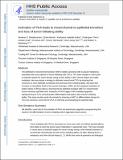Activation of PKA leads to mesenchymal-to-epithelial transition and loss of tumor-initiating ability
Author(s)
Pattabiraman, D. R.; Bierie, B.; Kober, K. I.; Thiru, P.; Krall, J. A.; Zill, C.; Reinhardt, F.; Tam, W. L.; ... Show more Show less
Downloadnihms828767.pdf (1.116Mb)
OPEN_ACCESS_POLICY
Open Access Policy
Creative Commons Attribution-Noncommercial-Share Alike
Terms of use
Metadata
Show full item recordAbstract
The epithelial-to-mesenchymal transition enables carcinoma cells to acquire malignancy-associated traits and the properties of tumor-initiating cells (TICs). TICs have emerged in recent years as important targets for cancer therapy, owing to their ability to drive clinical relapse and enable metastasis. Here, we propose a strategy to eliminate mesenchymal TICs by inducing their conversion to more epithelial counterparts that have lost tumor-initiating ability. We report that increases in intracellular levels of the second messenger, adenosine 3',5'-monophosphate, and the subsequent activation of protein kinase A (PKA) induce a mesenchymal-to-epithelial transition (MET) in mesenchymal human mammary epithelial cells. PKA activation triggers epigenetic reprogramming of TICs by the histone demethylase PHF2, which promotes their differentiation and loss of tumor-initiating ability. This study provides proof-of-principle for inducing an MET as differentiation therapy for TICs and uncovers a role for PKA in enforcing and maintaining the epithelial state.
Date issued
2016-01Department
Massachusetts Institute of Technology. Department of Biology; Ludwig Center for Molecular Oncology (Massachusetts Institute of Technology)Journal
Science
Publisher
American Association for the Advancement of Science (AAAS)
Citation
Pattabiraman, D. R. et al. “Activation of PKA Leads to Mesenchymal-to-Epithelial Transition and Loss of Tumor-Initiating Ability.” Science 351, 6277 (March 2016): aad3680 © 2016 American Association for the Advancement of Science
Version: Author's final manuscript
ISSN
0036-8075
1095-9203